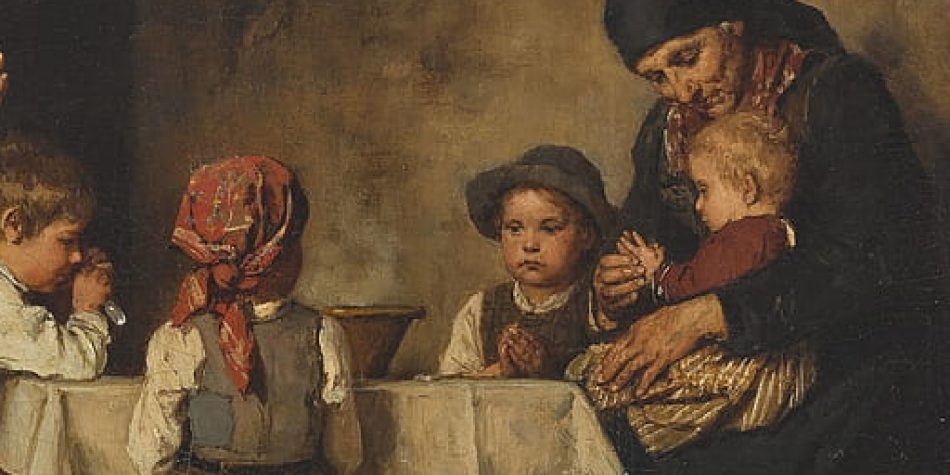Among all the many things parents aspire for in a child, one of the strongest desires and greatest dreams of many parents is that their faith will be passed down. In the Abrahamic religions of Judaism, Christianity, and Islam, parents are instructed to teach their children to love God with all their hearts (Deuteronomy 6:4-8). In the American Families of Faith research project, we asked 396 highly religious but racially, ethnically, and regionally diverse parents in the United States, “How important is it to you that your children follow in your faith?” The majority of parents responded that it was indeed important or very important.
In our secularizing world, however, even after presenting their own faith to their children, many religious parents ultimately watch in pain as their children’s religious and other life choices follow another path. A national Pew Survey on Religion & Public Life found that almost half (44%) of Americans surveyed had left the religion in which they were raised. This is a daunting statistic for parents who deeply value their faith and hope to see their children follow in their footsteps—while underscoring the importance of exploring the balance between generational religious continuity and children’s autonomy.
In Anne Frank’s The Diary of a Young Girl, she wrote, “Parents can only give good advice or put [their children] on the right paths, but the final forming of a person’s character lies in their own hands.” That’s something many highly religious parents ultimately come to understand, especially in our secularizing world. As taught in the classic Christian hymn, “Know Then That Every Soul Is Free,” also entitled “The Freedom of the Will”:
Know then that ev’ry soul is free
To choose his life and what he’ll be;
For this eternal truth is given,
That God will force no man to heaven.
This balance between parents’ profound desires for children to remain faithful and their simultaneous desire to honor their children’s agency showed up over and over in our own American Families of Faith project. As we’ve probed deeper into parents’ wishes to have their children remain in their religion, we discovered different ways parents navigated this significant wrestle. Below we highlight some of the findings from the original article published in the journal Psychology of Religion and Spirituality written with our colleague Betsy Barrow.
Parental desires for the passing down of faith. The nearly 400 religious parents we have interviewed exemplified a deep commitment to their respective religions and most expressed their perception of multi-faceted “blessings” their faith has brought into their lives, in spite of acknowledged challenges. Given an array of perceived benefits and blessings garnered, it is little wonder that most highly religious parents hold a deep desire for their children to remain committed to the same faith that has benefitted the parents. A number of parents described the importance of religious continuity as a “responsibility” of parents to promote and as a “blessing” to their children (if the children were willing to receive it). It was common for parents to share beliefs that their religion might help their children make better choices, help them face challenges, and protect them from emotional, physical, and spiritual harm.
Eli (all names are pseudonyms to protect confidentiality), a Conservative Jewish father, explained his hope that his children will embrace the family’s religious tradition, values, identity, and practices. He said:
It’s very important to us. What’s tough is that we do not control [it]. I do not think there is anything that we would [want more for them], other than their health and happiness. I do not think there is anything that is as core Jewish, to the core of being Jewish, [that] we would want more than our children, God willing, our grandchildren, and their offspring, to be Jewish and have the same values.
Jianguo, an Asian-American father and a convert to Christianity, spoke of the heavy responsibility he felt to pass his faith down to his children. “How to pass our beliefs to our next generation is a burden to me. [I pray], let our children believe what we have believed. … We want them and their next generations to have God’s blessings.”
An East Indian Muslim mother, Lamiah, also talked of the responsibility she felt to teach her children to honor God. She said:
So, in the course of … trying to raise children … your faith has to be a significant factor in that. Not only to fulfill your responsibility in passing along faith in God and in understanding that God loves you, and keeps you … and provides for you, and is there when even I am not there and will sustain you and make you whole. You have to have faith in that yourself and then you have to instill that faith into your children.
Timothy, a nondenominational Christian father, described the duty he felt to teach his children religious life principles in ways that are interesting and understandable to the child. He said:
Fathering puts a pull on you that’s not there without it because you realize that you have the responsibility for teaching these life principles in ways that are understandable and attractive. I mean if you believe that there’s a God and you believe that … the most important thing in the universe [is] how you relate to Him, then the most important thing in parenting is to raise your kids in a way that faith is going to be real, meaningful, and attractive to them in a way that they can understand it and deal with it.
Rachel, an Orthodox Jewish mother, described the value of flexibility in establishing religious expectations unique to each individual child. She said:
Somebody once said to me in a very nice way, “You have to have some … damage control, and at the same time, you want to also awaken in him the feelings for positive things.” So, in other words … choose your battles. And each child, the Torah tells us that you have to educate the child according to his will. I think a major parenting tip there … you can have family rules, but you have to know that within the family, you’re going to have so many individuals. And every rule has to be custom-made to the individual as well.
Part of this teaching comes through demonstrating real-life examples. Randall, a black Christian father, spoke of persistently living his beliefs day-to-day and addressed this challenge as he strived to set an example for his children. He said:
You’re trying to be an example. You remember your mistakes, and [your kids], they’re gonna make mistakes, [but] you just try to live according to your faith. You try to live out your faith in front of them. It ain’t easy all the time, because sometimes things do get to you and they see it, they do not see the Christian side [of you] … [and] I have to think, “What kind of example am I setting?” … I have to live out my faith, and sometimes it ain’t easy ….
A Muslim mother, Angie, said of her husband (originally from Jordan):
It doesn’t matter how much the father talks to the children [about religion], the children will learn from what the father does. … If my children see my husband go to the Mosque every night for prayer [which he does] he is setting an example. I don’t have to “teach” it. They are seeing it.
Such comments seem to echo Ralph Waldo Emerson’s quip, “Your actions speak so loudly, I cannot hear what you are saying.”
Even with all this teaching and providing an example, what of the 44% of American youth that tell their parents, “No, thanks”? Clearly, positive influence and example are sometimes not enough to entice children to make the same choices as their parents. A Jewish father named Seth lamented:
(Two of my brothers) married persons out of the faith and I don’t think they’ll have much religion of any sort now. I don’t think they’ll have much Christianity or much Judaism. I see the family dynamics, the relationship between my parents and them. … I mean, my parents love them very much but it hurt my parents. When we’re all together, although we love them all and we get along with them all, we see the differences. When we are all sitting around at the holidays [which are loaded with rituals] they [the non-Jews] just don’t get it. Being Jewish within a family of Jews was really important and marrying Jewish was real[ly] important to me. I wanted to be married to someone who had as much in common with me as possible. … There’s a certain framework for life and marriage in Judaism. … I look at the dynamics of a happy family, and it’s just all part of it.
For many families in the American Families of Faith project, religion was mentioned as a unifying “shared family vision.” For some others, like Seth, his parents, and his brothers, religion became a literal “di-vision”—two different visions. Yet if the first expressed desire of religious parents was that their children keep the faith, the very next desire was that they have the freedom to make that choice for themselves.
Children’s religious choices. Although diverse parents in the American Families of Faith project shared many reasons why it was important to them that their children follow in their faith, most also recognized that the decision was ultimately up to the child. This recognition of personal religious agency is taught throughout the Abrahamic faiths. For example, the Quran teaches: “There shall be no compulsion in [acceptance of] the religion” (Quran 2:256, Sahih International). Proverbs 22:6 (KJV) reads, “Train up a child in the way he should go: and when he is old, he will not depart from it.” In spite of the hope offered to parents of faith here, there is no promise that many youth will not depart—at least for a time. One way that parents reportedly honored children’s religious choice was by not forcing beliefs.
Brent, a Jehovah’s Witness father, explained that it is his duty to try to pass his beliefs on to his children, but also acknowledged that ultimately the choice of believing was up to them. He said:
It’s, again, that responsibility of instilling in your children, in their hearts, a love for God and the principles that we try to live, [and that] we try to pass on to them—fully realizing that they have the God-given right to choose not to follow. And that ultimately … we would want them to make that conscious choice [that] “I believe this is the best way I could be living my life.” And so we have the responsibility to lay that out in front of them. Then they have the responsibility to make that choice.
An Arab-American Muslim father, Abaan, explained the importance of not using harsh methods to force his daughter to believe, but rather introducing a foundation of faith through example and child-centered approaches. He said:
[Y]ou do not want to force people to accept what you think is true. [You] give them a good foundation … a good example. [I]t is very important. Hopefully, we do it in a way that she enjoys it and she accepts it by heart. Sometimes, we have seen in some settings that the parents are very harsh, in terms of how they teach religion to children. That environment is not accommodating toward children’s needs and we do not believe that is how it is supposed to be done. Nobody can keep their children in a religion.
Aaron and Kira, a Lutheran couple, discussed their parental responsibility to expose their children to religious experiences but acknowledged that faith cannot be forced. Aaron said, “We feel and felt that our job was to expose them to church. But to make them have our faith—we can’t do that.”
Vickie, an Episcopalian mother, described how she introduced her children to activities within her religion but did her best to not be overbearing in her approach:
I think the biggest thing is to introduce them to the church, get them involved, and then know that they’ll make their own decision at some point. Try not to force it too much, down their throats, but just giving the opportunity to learn what it’s about.
Many parents we interviewed supported their children’s agency by encouraging them to learn and think for themselves, to study other faiths, to ask questions, and allowed their children to take risks and sometimes fail. This was the experience of Devon, a 17-year-old Baptist son. He said:
One of the key things that my parents did, which I am very grateful for, is they give us a good amount of freedom to think, to process things. [W]e’ve been taught to really think things through [in] our own brains and we can ask them any questions if we need to. And they definitely give me that measure of freedom to make it my own decision.
Miriam, a Conservative Jewish mother, similarly talked about exposing her children to different experiences in life so they can know what their choices truly are:
I think it’s good to expose kids, sometimes, to the extremes and then let them see what that’s like, and then later in life they can choose what they want to do. But if they do not know what’s out there, it’s sometimes hard to know what your choices are.
Understanding and reconciling with children’s choices. Parents, especially those with teen and emerging adult-aged children, frequently discussed how they felt about the religious choices of their children and how they as parents are responding to their children’s different levels of religious commitment. For many parents, these interpretations were characterized as an ongoing process of understanding and acceptance, or even peace, regarding their children’s agency.
Not only were the interviewed parents supportive of this expression of agency, but they demonstrated respect for their children’s agency through learning to listen to their children’s ideas, expressing trust in their children, and by making ongoing efforts to develop strong relationships with their children. Nasiha, a 17-year-old Muslim daughter, explained how her parents encouraged her to share with them why she believes and why she has chosen to follow Islam. She said:
When you reach maturity, you have the option of following Islam, or other religions, or having no religion. Our parents gave us all the options. They asked us … do we want to follow them and they [also] asked us, “Why?” It was not just going [to be], “What we do … just continue doing it.” They asked us why are we following this religion and what we do it for. So when you’re asked that, and you have to think about the answer, you have to contemplate your cause for it.
On the opposite end, Yuusif, an Indian Muslim father, talked about how he and his wife devote themselves to understanding their children’s viewpoints, beliefs, and challenges. He said:
Instead of just saying, “Do this, don’t do this,” we are trying to [help] them understand, and reason with them. Being constantly alert with them and close to them in understanding what they’re going through … and being in touch so that they do not think, “Well, my parents grew up in a different place, [a] different generation, they don’t know.” [We are] trying to keep up with them. … It can be done. And, of course, we also believe that when you try to do something sincerely, then there is divine help to achieve that. Which doesn’t mean that each one of those children will turn out to be saintly … but at least you’ve done [your part].
Jason, a black Baptist father, explained that it is more important to him that his children love the Lord and exhibit religious character ideals than it is for them to choose to belong to the same church as he does. Jason said:
I have learned, our children all love the Lord. [However], we work and serve in completely different types of churches, and so, while the foundation is the same, the manifestation or the demonstration of it is quite different. So, we’ve tried to teach our children … by how we live as opposed to hammering into them, “You will, you will, you will.” [We have tried to teach by] them seeing, “That’s real because I see it in my parents. I want that [faith], and the influence that they’ve had on us.”
Even when children’s choices conflicted with the parents’ own dreams and expectations for their children, many parents conveyed a belief that it was important to accept the religious choices of their children. Cindy, a black Baptist mother, recognized that her adult children must make their own choices but described the conflicted feelings she sometimes has accepting their religious decisions. She said:
And of course, now that they’re grown, they have to make their own decisions. But I still do not understand how you can work all week long and not go to church on Sunday, and of course, they do not always do it. But they’re grown now [and] they have to make their own decisions. That’s one of the biggest ones.
Conclusion. Religious parents are in a unique position to offer a foundation of faith to their children during childhood, adolescence, and emerging adulthood as influential guides in their children’s lives. Laying a foundation of faith may be accomplished through parental religious teaching, expectations, lived example, shared spiritual and religious experiences, and relational warmth—balanced with an allowance for the children’s agency and respect for their opinions.
The crucial process of finding a balance in the combination of passing down religious beliefs and accepting children’s religious choices confronts almost every religious family. Balancing these two responsibilities grows ever more difficult as confirmed by some research, as cultural values shift and a societal emphasis on individual choice increases.
Despite whatever dreams parents have that their children hold fast to the religion of their childhood, ultimately the “eternal truth” of agency allows the children “to choose his life and what he’ll be.” The parents we interviewed navigated this duality by striving to hold fast to their love of God while continuing to love their children, although sometimes doing so with broken hearts.
In a landmark study, the late Vern Bengtson and colleagues stated back in 2013, “Families do matter in determining the moral and religious outcomes of young adults, and they matter a great deal” (emphasis in original). Although child outcomes are uncertain, even in the most faithful and relationally warm families, the approach that parents take in religious socialization and recognition of children’s autonomy has a significant impact. Focusing on positive processes of religious socialization (as described above) rather than religious outcomes may help parents find balance as they promote religious continuity while still honoring agency in their children.
For additional reading:
What is Holy Envy and How Can it Change Our World?
Evangelical Christian Families: “God Wants Us … To Be Strong”
Muslim Families: A Closer Look at Answering to Allah
Latter-day Saint Families: Eternal Perspectives
Mainline Protestant Families: Loving God and Family Members
Jewish Families: How Teachings and Traditions Strengthen Marriage and Family Life
Catholic and Orthodox Christian Families: Confession and Forgiveness
















